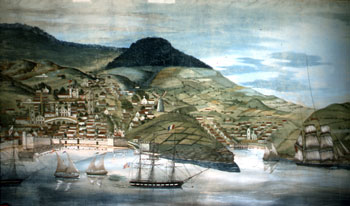
New Bedford Whaling Museum
Portuguese Fado, "A Cancao do Emigrante"
The Azores are a Portuguese archipelago in the Atlantic Ocean consisting of nine islands. They are about 930 miles west of Lisbon and approximately 2,400 miles from the east coast of North America. The islands were created by volcanic eruptions. Due to their location, the climate is mild, oceanic, and subtropical. The average annual rainfall increases from east to west, and it ranges from 27.6 to 63 inches. Mount Pico is the highest peak at 7,713 feet. Sao Miguel, is approximately 85 square miles and the largest island. The island of Fayal is known as the "Blue Island" and has a main port at Horta.
The islands were settled by people from mainland Portugal. During the 19th century, agriculture and whaling were the mainstays of the islands' economy. Large pods of whales like the blue, sperm, and humpback migrated around the islands during the spring and summer. Whaling brought many vessels here to drop anchor, and re-provision with fresh fruit and vegetables, such as bananas, potatoes, and onions. Known to the New Bedford whalemen as the "western islands", the Azores was a place that provided additional skilled crew members for many vessels.
Frequently, New England whalers would sail for the Azores and pick up Portuguese men to round out their crews. When the ships returned to New England, the Portuguese whalers would stay on until other opportunities arose or settle in their new country. The Portuguese fado song, "A Cancao do Emigrante" or "Song of the Immigrant" tells the listener if they leave the country to take a guitar with them and play it when they are sad or homesick. To listen to a clip of "A Cancao do Emigrante", click the "play music" button above.
JavaScript required access all features of this site. Use Browser Back to return.